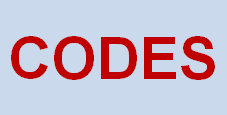CODES / fit / kriging
Train a Kriging
Contents
Syntax
- kr=CODES.fit.kriging(x,y) builds a kriging based on the training set (x,y).
- kr=CODES.fit.kriging(...,param,value) uses a list of parameters param and values value (c.f., parameter table).
Description
For a training set ![$\left[\underline{\mathbf{X}},\underline{Y}\right]$](kriging_eq05815563708094362795.png) made of pairs
made of pairs  and
and  such that:
such that:

and a mean function  and an auto-correlation function
and an auto-correlation function  , the covariance function is defined as:
, the covariance function is defined as:
![$$k\left(\mathbf{x},\mathbf{x}^\prime\right)=\sigma_Y^2K_\theta\left(\mathbf{x},\mathbf{x}^\prime\right)+\sigma_n^2\mathbf{I}\left[\mathbf{x}=\mathbf{x}^\prime\right]$$](kriging_eq02096386015237585671.png)
where  is the Kriging variance and
is the Kriging variance and  is the inherent variance, also referred to as nugget or observation variance.
is the inherent variance, also referred to as nugget or observation variance.
The training covaraince matrix and mean matrix are defined as:
![$$\Sigma_{tr}=\left[\begin{array}{ccc}k\left(\mathbf{x}^{(1)},\mathbf{x}^{(1)}\right) & \dots & k\left(\mathbf{x}^{(1)},\mathbf{x}^{(n)}\right)\\\vdots & \ddots & \vdots\\k\left(\mathbf{x}^{(n)},\mathbf{x}^{(1)}\right) & \dots & k\left(\mathbf{x}^{(n)},\mathbf{x}^{(n)}\right)\end{array}\right]$$](kriging_eq08887554802893771971.png)
![$$\mu_{tr}=\left[m\left(\mathbf{x}^{(1)}\right),\dots,m\left(\mathbf{x}^{(n)}\right)\right]$$](kriging_eq05363446584714253241.png)
The Kriging prediction and prediction standard error are defined as:


Correlation functions
One covariance function is available:
- Gaussian:
![$$K_\theta(\mathbf{x},\mathbf{x}^\prime)=\exp\left[\frac{||\mathbf{x}-\mathbf{x}^\prime||^2}{2\theta^2}\right]$$](kriging_eq05169985291235111773.png)
Mean Functions
One mean function is available:
- 0 order polynomial:

Solvers
Two solvers are available:
- 'CODES': An implementation from scratch.
- 'DACE' Uses the DACE Toolbox with minor numerical improvement in the prediction.
Training Options
| param | value | Description |
|---|---|---|
| 'scale' | {'square'}, 'circle', 'none' | Define scaling method for the inputs (c.f., Scaling for details). |
| 'UseParallel' | logical, {false} | Switch to use parallel settings. |
| 'theta' | numeric, { [ ] } | Value for kernel parameter. If [ ], should be calibrated. |
| 'delta_2' | numeric, {0} | Only if 'regression' set to true. Value for “nugget” parameter. If left to default, should be calibrated. |
| 'mean_fun' | {'poly0'} | Mean value function, see Mean functions. |
| 'cov_fun' | {'corr'} | Correlation function (also referred to as kernel or auto-correlation function), see Correlation functions. |
| 'scale_y' | {'square'}, 'circle', 'none' | Define scaling method for the ouputs (c.f., Scaling (meta) for details) |
| 'solver' | {'CODES'} or 'DACE' | Type of solver to use to train the Kriging, see Solvers. |
| 'regression' | logical {false} | Whether regression kriging should be used. This is achieved by adding a “nugget” 'delta_2' on the diagonal of the correlation matrix, see Description. |
| 'display' | logical {true} | Wether information should be displayed. For now, only display warning if correlation matrix needs to be conditioned (further than 'delta_2'). |
| 'theta_min' | numeric, { [ ] } | Only if 'solver' set to 'DACE'. Lower bound for the 'theta' search. |
| 'theta_max' | numeric, { [ ] } | Only if 'solver' set to 'DACE'. Upper bound for the 'theta' search. |
Evaluation and Post-Processing
 |
Capabilities of a Kriging object. |
Mini tutorial
 |
A mini tutorial of the capabilities of the Kriging class. |
References
Copyright © 2015 Computational Optimal Design of Engineering Systems (CODES) Laboratory. University of Arizona.

|
Computational Optimal Design of Engineering Systems |

|